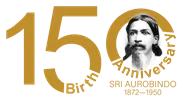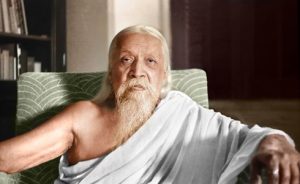“Rabindranath, O Aurobindo, bows to thee! O friend, my country’s friend, O Voice incarnate, free, Of India’s soul! … The fiery messenger that with the lamp of God. Hath come…
Rabindranath, O Aurobindo, bows to thee.”
In the year 1928, the leader had now left politics and had gone to Pondicherry, where he plunged himself into the practice of Yoga.
The poet Tagore once again paid him a visit and declared: “You have the Word and we are waiting to accept it from you. India will speak through your voice to the world, ‘Hearken to me!’…
Years ago I saw Aurobindo in the atmosphere of his earlier heroic youth and I sang to him: ‘Aurobindo, accept the salutations from Rabindranath’. Today I saw him in a deeper atmosphere of a reticent richness of wisdom and again sang to him in silence: ‘Aurobindo, accept the salutations from Rabindranath!’”
How does one describe or speak about such a personality? Sri Aurobindo has been called a scholar, a literary critic, a philosopher, a revolutionary, a poet, a yogi and a rishi. He was all these and much more. To have even a glimpse of the true Sri Aurobindo, we have to turn to the Mother: “What Sri Aurobindo represents in the world’s history is not a teaching, not even a revelation; it is a decisive action direct from the Supreme.”
In fact, Sri Aurobindo declared, in no uncertain terms that nobody could write his biography and added: “Neither you nor anyone else knows anything at all of my life; it has not been on the surface for men to see.”
But he was not altogether averse to this effort and even made corrections when some biographers made the attempt. In the process the veil that hid the divine mystery was lifted a little.
The Collected Works of Sri Aurobindo are available for download on Sri Aurobindo Ashram’s website. Each volume can be viewed and downloaded in PDF format.




